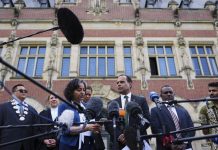By
Jehanie Milky Nagon
Africa-Press – Mauritius. How can the public and private sectors hold onto the unprecedented shifts of AI, robotics, and digital innovation? How can these modern intelligent technologies intersect with the amplified needs for interconnected future policy and regulations in the geopolitical, socioeconomic, technological, and security spaces? Complex questions that can mesmerize each curious mind. Yet, it is globally significant for an open dialogue in the most transformative era of our times.
But, in the Global Interdisciplinary Online Course, “Understanding AI, Robotics, and Its Multi-Dimensional and Multi-Spatial Implications for the Public and Private Sectors,” complex questions are not just curiosity against the current status quo but also driven by the ongoing digital data and case studies that need a deeper understanding, attention, and proactive solutions—which are fundamental in today’s most innovative global shifts.
The 8-week program with a 2.5-hour intensive dialogue finally had its closing on July 10th, 2025. The session circled around the theme “Economic Diplomacy in the Digital Age,” attended by esteemed professionals from different regions (researchers, practitioners, executives, and tech enthusiasts) and by renowned expert guests from different industries: Daniele Sangion (UniCredit Group, Austria), Antonio Salmeri (Space Law, Lunar Policy Platform), Muntasir Mamum (Ministry of Foreign Affairs, Bangladesh), and Ronald Derler (Kompetenzzentrum Digitale Wasserwirtschaft).
In the final week of the program, notable speakers shared comprehensive insights on the current trends of artificial intelligence and modern intelligent systems and unveiled the dynamic use, effects, influence, and risks of these technologies in all public and private sectors.
The concluding session delved into digital economic diplomacy, global strategy, digital finance, technology and infrastructure risk, and market access and innovation.
Deepfake Dangers and the Rising Cost of Cybercrime
The first round of the program was explored by a distinguished keynote speaker, Mr. Daniele Sangion, a Chief Information Officer from UniCredit Bank Austria. He started his discussion by playing a deepfake video to show how threatening AI and similar technologies can be when it comes to cyberattacks, physical threats, business disruptions, information bias, evolution of frauds, phishing, fake identities, and cybersecurity risks.
Coming from internal experience and national cooperation efforts, Mr. Sangion painted a striking picture of the staggering scale of the issue, that “cybercrime is a trillion-dollar business” and should be the third country in the world, after the US and China, in terms of GDP. He explained that cybercrime today includes the misuse of AI through deepfake voices, fake identities, fake shops, and phishing campaigns—tools that fraudsters can now use at scale. He gave concrete examples, mentioning how thousands of deepfake shops of Bank Austria were generated and how attackers used AI to create websites that looked “really similar to your website,” tricking people into entering their login credentials and OTPs. He recalled that even colleagues were deceived during a real-time call by a deepfake version of himself, highlighting how easy it has become “to not recognize me.” According to him, “awareness is the first control measure,” and reinforcing it is essential at every level of internal and external security.
He emphasized that “now, there are not any more silos” in the threat landscape, explaining that crimes can start in the digital realm and create physical consequences—or vice versa—making it essential to look at security in a holistic way. He also shared how Bank Austria, as part of an initiative from the Austrian government, works with other banks and other main companies and launches some initiatives to support the Austrian citizens and to create awareness on phishing, frauds, and deepfakes. These efforts include integrating fraud awareness and security into school-level education programs.
While AI poses serious cyber risks, Mr. Sangion made it clear that it also provides a critical advantage for defenders when used responsibly: monitoring attacks, enhancing security resilience, deepening institutional memory, and reinforcing human awareness.
Law Beyond Earth: Digital Policy in Space Exploration
After the first speaker, the second talk was delivered by Dr. Antonino Salmeri, a space lawyer specialized in the governance of space resources and lunar activities, a world-class expert in the field of space law, and Director of the Lunar Policy Platform. Dr. Salmeri presented on the current status of lunar activities and outlined the legal and policy elements required to enable their prosperous, peaceful, safe, and sustainable conduct.
Dr. Salmeri highlighted that while space is not the Wild West, thanks to international agreements like the Outer Space Treaty, more work is needed to design specific governance solutions suitable to the ambitions of existing plans from governments and companies to establish long-term and large-scale operations on the Moon by the end of the next decade. To this end, he presented the work conducted by the Lunar Policy Platform, a globally established group facilitating the development of policies and standards and providing expert advice to the United Nations, governments, and companies on the legal and policy aspects of their lunar-related engagements. He emphasized that without cooperative governance, the Moon’s shared promise risks becoming a contested domain. Through law and policy, he argued, humanity can ensure a peaceful, prosperous, and inclusive future beyond space.
Dr. Salmeri reminded the audience that “space law exists and that it provides solid foundations for us to build upon. There is no Wild West in space.” Yet, he emphasized, “If we want to have a thriving economy where no economy existed before, we do need more than that. We need policies and standards.” That, he explained, is the mission of the Lunar Policy Platform: to work with all actors—governments, industry, and academia—to develop tools that are going to enable a peaceful, prosperous, and cooperative future on the Moon for the benefit of all humanity.
Digitalizing the Invisible Backbone: Ronald Derler’s Perspective on Cybersecurity in the Water Industry
The third keynote expert was Mr. Ronald Derler, CEO of the Competent Center for Digitalization in the Water Industry, who offered a rare and highly relevant perspective on how critical infrastructure is undergoing a digital transformation—with both promise and peril. Drawing on his experience as a cybersecurity leader, military and police veteran, and Harvard graduate in crisis leadership, Mr. Derler addressed the overlooked but essential challenge of protecting water supply and wastewater systems across Europe. He stated plainly that this is not about flying to the Moon but about ensuring that millions of people have clean water every day.
With over 8,000 water-related organizations in Germany alone, many operating for more than a century—Mr. Derler spoke plainly about the challenges ahead. He said digital transformation is no longer optional—it is essential for managing everything from rising energy costs to labor shortages. But he also warned that greater connectivity means more risk. He pointed to real cyberattacks on water systems in Germany and Texas, showing how remote access gaps and outdated industrial controls can be serious liabilities. He addressed a disturbing issue that OT systems are also vulnerable to attacks, stating, “You don’t have to hack the systems; you just have to find the systems, and you can do what you want.”
Mr. Derler and his team launched the Situation Center Cybersac at Water, Europe’s first industry-wide Security Operations Center dedicated to the water sector to address water challenges. This operates 24/7, raises awareness through specialized e-learning, and conducts workshops to promote digital resilience. Even with improved technical defenses, smaller utilities still face legal and compliance pressures. European cybersecurity rules, he noted, are hard to keep up with—especially when supply chains are fragile. He also raised concerns about social engineering, saying it now accounts for over 90% of cyber incidents. AI, he explained, is making both attackers and defenders stronger.
Mr. Derler’s response is not just about better firewalls. He is advocating for a broader strategy: a “zero trust” approach, clear software transparency requirements, and stronger cooperation with national security agencies. To him, solving these issues is not just technical—it is about people, priorities, and planning ahead.
From Static States to Fluid Futures: Reimagining Governance in the Age of Digital Sovereignty
Following the third keynote guest is a notable expert, Dr. Syed Muntasir Mamun, Director General of the ITIT (ICT) of Bangladesh’s Ministry of Foreign Affairs.
This high-ranking official from the prominent South Asian country brought a bold and deeply reflective narrative on the future of governance. With decades of academic and strategic engagement, he started by situating a theme—governance, imaginaries, and digital space—as the product of over a decade of inquiry into the evolution of republics and state systems. Focusing on the Global South, Mr. Mamun emphasized how 80% of the world’s population who are living in bottom-of-the-pyramid markets are still experiencing institutional voids in governance, economy, welfare, and identity. He asked how people in post-colonial societies relate to the state today. Mamun said that digital space is not just about cyber warfare anymore—it has become “the core terrain of livelihoods, identities, and aspirations.” Because many regions still face “institutional voids” in areas like governance, welfare, and the economy, he noted that new frameworks are emerging. These, he said, aim to bypass outdated systems through digital sovereignty and innovation.
In response to this shift, he introduced the “AAA” model: Adaptive, Agentic, and Agile—as a new way of thinking about governance in a world where timelines are shrinking fast. “Ideas once projected for 2100,” he reminded the audience, “must now be realized by 2030.” This “Fluid Institutions” model is built on the principle that governments should not rule over the people but serve them—moving away from hierarchical, slow, and procedural bureaucracies toward fluid, agile, and digital-first governance structures. At one point, Mamun gave concrete examples to make his point. “We’ve seen this in Rwanda with drones for healthcare delivery,” he said. “In Ghana with blockchain land registries, and in Bangladesh with mobile money that reaches even the poorest.”
As he wrapped up, he emphasized a shift in mindset: “Governance today is about real-time intelligence.” It is about measuring trust, building legitimacy, and creating new institutional narratives that embrace digital tools and fluidity.” In his words, “We need institutions that are dynamic, tech-savvy, and citizen-first. Fluid institutions for a fluid world.”
* * * *
The Understanding AI and Robotics Course, organized by IFIMES (International Institute for Middle East and Balkan Studies), SILKROAD 4.0 Platform, Scientific Journal (European Perspectives), and their consortium of international partners (D-8, ICCD, IAF, THC, Diplomatic Academy, Diplomatic Magazine, and many more), explored globally interdisciplinary topics that gave thought-provoking insights and timely information to participants from Asia, Africa, Europe, the Americas, and Australia/Oceania.
This unmatched collective exchange of data is what opens doors to the investigative mind—to help great people analyze, deepen their understanding, and awaken their consciousness in this era of thrilling and fast-paced intellectual developments.
This is just the inception of the deep transfer of knowledge—to prepare for what lies ahead in the upcoming initiative: Global Academy for Future Governance. To equip each future attendee with the up-to-date data and develop a profound expertise that can bring lasting change not only in the Global North and the Global South, but also in the immersive transformation of digital realms.
moderndiplomacy
For More News And Analysis About Mauritius Follow Africa-Press







